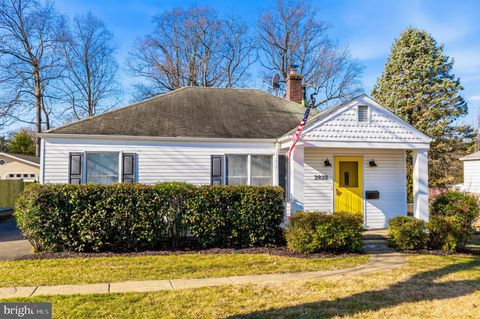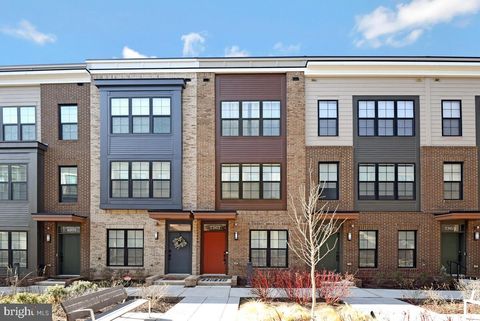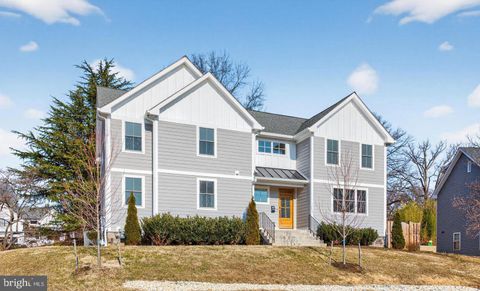Introduction
You’re not just buying a home in Falls Church City—you’re buying the name.
In this video, we're breaking down the real pros and cons of living in Falls Church City.
Not the touristy stuff, not the glossy brochure highlights…
We’re talking about what it’s actually like to buy a home and live here.
If you’re trying to figure out whether Falls Church is worth the price tag…
Or if the lifestyle matches what you’re looking for, you’re in the right place.
Before anything else, if you want a more in-depth look at Falls Church, where talk about everything there is to know about the area, be sure to check out our ultimate guide on it too.
Alright, let’s get into it.
Cons #1: The Limitations of a Small City
Let’s start with the cons, because if these don’t faze you, Falls Church might be a great fit for you.
Falls Church City is tiny. Like, 2.2 square miles tiny.
Now, that sounds charming at first—walkable streets, small-town vibe, everyone knows your dog’s name at the park.
But when you're buying into a place this small, you have to understand what you're not getting.
There’s only so much you can fit into 2.2 square miles. That means the commercial footprint is limited.
You’ve got a few solid local spots—some coffee shops, restaurants, and groceries.
But don’t expect a full-on Target, a Costco, or a shopping center with ten different date-night options.
If you want that kind of variety, you’re probably heading to Mosaic District, Tysons Corner, or Seven Corners.
And let’s be real—those aren’t far. But you’re still hopping in the car for things other areas just have built-in.
Same thing goes for public amenities.
You’re not going to find a giant rec center, a massive public library, or full-scale sports complexes inside Falls Church City limits.
Those kinds of amenities are more common in the surrounding Fairfax County area, which—ironically—is where most Falls Church City residents go when they want more space to spread out.
And because the city’s footprint is so limited, it creates a ripple effect.
A smaller city means less room for schools to grow, which brings us to our next con: tight school capacity.
Cons #2: Tight School Capacity
Because Falls Church City is so small, the school district is small, too.
We're talking about a single high school, one middle school, and two elementary schools.
That tight setup can be a double-edged sword.
On one hand, families move here for the schools—especially because Falls Church City Public Schools have a strong reputation.
But here’s the catch: when space is limited, there’s less flexibility.
You don’t have a bunch of school choices or leeway in zoning.
So when enrollment numbers creep up, the city can find itself having to redraw school boundaries just to keep things balanced.
And nobody likes the idea of buying into one zone and finding out it might change.
This pressure ties directly into the housing market.
Because so many buyers are coming in specifically for the schools, demand gets intense.
You’re not just buying a house—you’re trying to buy a seat in a school.
That’s why you’ll see bidding wars on homes that check the right boxes.
Families aren’t just competing on price—they’re competing for access.
And since the schools are such a driving force behind why people move here, they also influence home values in a major way.
Cons #3: Highly Competitive Housing Market
Alright, so let’s say you’re sold on the schools, and you’re okay with the small-town footprint.
The next hurdle? Actually buying a home here.
Falls Church City has very limited housing inventory.
That’s just the reality of trying to squeeze a residential market into 2.2 square miles.
There’s only so much land, which means you’re working with a much smaller pool of homes…
Especially if you're hoping for things like newer construction, more square footage, or even a decent-sized yard.
When something good hits the market here, it moves fast.
Multiple offers, waived contingencies, escalation clauses—you name it.
If you’re not already working with a solid agent who knows how to navigate this market, you’re coming in at a disadvantage.
This isn’t the kind of place where you can casually browse for a few weekends and then submit an offer on Monday.
You need a strategy.
You need someone in your corner who understands the timing, the pricing psychology, and how to write an offer that gets noticed.
And with limited supply and high demand, you already know what that does to prices.
Homes in Falls Church City command a premium.
You’re often paying more per square foot here than in surrounding areas…
Especially when you compare it to homes in 22042 or 22043, which are part of greater Falls Church but fall under Fairfax County’s jurisdiction.
Cons #4: Traffic Congestion
Now here’s the thing about Falls Church City: its location is prime.
On paper, it checks every box for commuters.
But when you’re that well-connected, you’re also a through-route—and that’s where the problems start.
Traffic congestion is real, especially during peak commuting hours.
Streets like Broad Street and Washington Street aren’t just busy…
They’re borderline clogged during rush hour.
It’s not unusual to hit a red light and sit through it… twice.
Even though Falls Church City is walkable, that doesn’t mean it’s always convenient
A lot of intersections aren’t designed for the volume they’re now getting.
It’s a small-town street grid being asked to handle regional traffic.
You’ll see it on weekday mornings, and you’ll definitely feel it on weekends…
especially during events or when that Farmers Market hits every Saturday.
Great vibe, don’t get me wrong—but good luck finding street parking within a few blocks of downtown if you’re not out early.
So, convenience comes with congestion.
And if you’re the type who hates traffic or gets anxious hunting for a parking space, this is something to factor in before you move in.
Pro #1: Prime Location
Alright—if I didn’t scare you off with the cons, then you're probably here for the good stuff.
And let me tell you, Falls Church City's location is a win.
You’ve got I-66, Route 50, Route 29 running right by you.
Two Metro stops, East Falls Church and West Falls Church, connect you directly to D.C.
You’re not just “kinda close” to the action… you’re right in the middle of it.
Now, if you’re commuting, this spot is excellent.
Arlington is right next door…
Whether you're heading to Clarendon, Pentagon City, or Amazon HQ2 in Crystal City, you're in business.
Tysons Corner? Just up the road.
That’s where you’ve got Capital One, Booz Allen, Freddie Mac, and a more Fortune 500 players.
McLean? That’s home to the CIA’s and Mars Inc.
But this isn’t just about work
Falls Church is wedged in between some of the best recreational and entertainment zones in Northern Virginia.
You want world-class shopping? Tysons has it.
You want bars, dining, and nightlife? Arlington’s got you.
Want to hop into D.C. for a museum or a concert?
You're there in 20 minutes—or faster if Metro's running smoothly.
So whether you’re commuting for work, meeting friends for happy hour, or just looking to live near the action without being right in the middle of it…
Falls Church checks that box. Multiple times.
Pro #2: Lively Local Culture
Let’s talk about what makes Falls Church really special: the local culture.
This place isn’t just a bunch of houses on a map. It’s got soul.
Take a walk down Broad Street, and you’ll see what I mean.
Local businesses are alive and well here.
That’s a big deal when you're buying a home, because you're not just moving into a neighborhood, you're stepping into a community.
You’ve got places like Rare Bird Coffee, The Falls, and Clare & Don’s Beach Shack where the vibe is personal, not corporate.
And yes—Ellie Bird is making serious waves with Michelin-quality food right in town.
It’s not just food too.
Falls Church shows up for its events.
The Farmers Market runs every Saturday.
You've also got Taste of Falls Church, Farm Day, Tinner Hill Music Festival, and Concerts in the Park.
These aren’t one-off things—they happen every year, and they bring the whole town together.
If the arts are your thing, there’s more to love.
Creative Cauldron puts on serious local theater.
The State Theatre brings in live music.
ArtSpace and the Falls Church ArtWalk spotlight local talent and creativity that keeps the city feeling fresh.
Bottomline is….
If you're buying a home and you're looking for community, connection, and culture, Falls Church delivers.
Pro #3: Practical Perks of a Small City
Here’s where Falls Church’s size actually works in your favor.
Because it’s an independent city, you’re not just another number in a massive system.
You’ve got real access to local government.
City Council meetings? Easy to attend.
Want to meet your school board rep or weigh in on neighborhood changes? Totally doable
If you’re planting roots, that kind of civic access can go a long way.
And then there’s the service side.
Falls Church runs its own schools, police, utilities, and public works, separate from Fairfax County.
That means faster trash pickup, quicker street repairs, and more responsive emergency services.
It’s the little things that make homeownership smoother.
Lastly, the feel of the place…
You get the perks of urban living without the density overload.
It’s walkable and connected, but without high-rises or packed apartment towers
For buyers looking for that sweet spot between location and livability, this checks a lot of boxes.
Pro #4: Top-Ranked School District
Let’s talk schools, because if you’re buying in Falls Church City, this is probably high on your list.
Falls Church City Public Schools has consistently ranked as the #1 Best School District in Virginia according to Niche.
And that’s not some random list.
Niche pulls together a mix of hard data and community feedback:
Test scores, college readiness, graduation rates, plus input from parents, teachers, and students.
So it’s not just about raw academics, it’s also about student experience, teacher quality, and long-term outcomes.
Now, what does that mean for you as a buyer?
Well, first: schools drive home values. It’s simple supply and demand.
Parents want to live in districts with great schools, and Falls Church City only has so many homes to go around.
That drives competition and helps your home hold its value, even in a shifting market.
But there’s more.
This is a small district with one of the highest per-pupil spending rates in Virginia.
That gives the schools room to offer more individualized attention…
Whether your kid needs gifted programs, extra support services, or enrichment opportunities that go beyond the basics.
You’re not just buying into a district that looks good on paper, you’re buying into one that delivers real resources for real families.
If schools are a top priority for your move, and for many of my clients, they are, Falls Church City gives you a lot to feel confident about.









